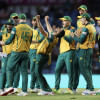Non-conformist blockbuster conserves charm

Bob Woolmer, the late South African coach renowned for his cricketing insights and innovation, once said, "Football is a game of space, whereas cricket is a game of time," in his book 'The Art and Science of Cricket', shedding light on the trials and tribulations a cricketer goes through on the battlefield.
Woolmer's book, a decade in the making and published in 2009, emerged at a time when the shortest format of the game -- Twenty20, designed to draw a wider range of audiences for the sake of making cricket a global sport -- had already found its footing and threatened the status quo of its elder siblings -- Tests and the 50-over format -- in terms of mass appeal.
Much like how fast food has surpassed fine dining in popularity in this millennium, the intimidating T20 cricket proved to be an unstoppable force as the cash-rich franchise leagues reshaped the sports' landscape, leading the game's global governing body ICC to hold the T20 World Cup in every two years.
Eventually, when it came to the 20-over format, cricket matches became less and less about the element of time and more about the initial conditions: the nature of surfaces, playing conditions, which had become predominantly batting-friendly, and about the number of power-hitters a team possess.
However, the ninth edition of the T20 World Cup, an expanded version featuring 20 teams from the last edition's 16, disproved the existing consensus and went on to preserve the timeless charm of the game.
At the same time, the 2024 instalment churned out almost everything that makes it an undeniable blockbuster, meeting the ever-increasing demands of modern times.
From even contests between the leather and willow, undoing extrapolations made from recent performances in major franchise leagues, to perennial underachievers and minnows having their moment in the sun, the marquee event held in West Indies and the USA has ticked all the boxes for a truly memorable global tournament.
The associate teams disproved the notion of being pushovers, as former champions Pakistan and England found out.
Pakistan fell prey to the USA in one of the greatest upsets in the history of the tournament, setting the ominous tone of the last edition's finalists' eventual exit. On the other hand, England were forced to edge past a driven Scotland in the group stage based on net run rate.
And even Nepal, devoid of any expectation, almost pulled off the highly improbable, losing to South Africa and Bangladesh by a whisker, whereas teams like Namibia and Oman made their mark by locking horns in a Super Over thriller, one of the seven final-over nail-biters witnessed in the group stage.
USA, meanwhile, en route to amping up cricket's fan-following in the country, remained hungry for more as they cemented further history by entering the second round – the Super Eights – in their maiden appearance, setting the narrative for one of the fairytale triumphs of the mega event.
Even though fellow hosts West Indies could not make the cut to the semifinals, they would be pleased to give their fans the impression that the two-time champions are on the right track, especially following a string of debacles in the preceding white-ball World Cups.
The team that accompanied the West Indies in the Super Eights were Afghanistan, who created their own fairytale chapter. Defying odds, Afghans first scripted New Zealand's exit and then set the Super Eights alight by taking down the mighty Australia before holding their nerves against Bangladesh in two World Cup classics.
Afghanistan's triumphant run was eventually cut short by South Africa, who shrugged off the tag of 'Chokers' to land a coveted place in the final -- a first for the Proteas after being on the receiving end of seven excruciating exits in the last-four stage.
As far as individual glories are concerned, elite superstars like Australia's swashbuckling opener Travis Head, India's pace spearhead Jasprit Bumrah and opener Rohit Sharma, among others, lived up to their reputations while promising talents were unearthed in Bangladesh's leggie Rishad Hossain, pacer Tanzim Sakib, et al. Rishad was the joint third in the wicket-taker's column before the final, a list that features an almost even mix of pacers and spinners in the top 15.
Last but not the least, the 29-day tournament verified the notion that an international competition is a completely different beast, in terms of the challenges it presents, compared to what franchise leagues keep dishing out.
Case in point, the influence of the latest edition of Indian Premier League (IPL), which made way to a bunch of 200-plus scores, did not go onto set the tone in the USA and West Indies by any means. Prior to Saturday's final, this edition saw only four 200-plus totals in 54 matches -- three of which materialising in Saint Lucia – while 175-plus totals were achieved 16 times.
Negating the IPL narrative further, Virat Kohli, who had been IPL 2024's highest run-scorer, limped the entire tournament up until he got his bearings right in the final, while a struggling Hardik Pandya rekindled his form in every department. Like Pandya, his IPL teammates in Suryakumar Yadav, Rohit and Bumrah from bottom dwellers Mumbai Indians stayed unfazed in national colours.
All in all, this T20 World Cup will go down in the memory lane as an unforgettable one that refused to play by conformism, and yet it captivated audiences worldwide like never before.

 For all latest news, follow The Daily Star's Google News channel.
For all latest news, follow The Daily Star's Google News channel. 











Comments